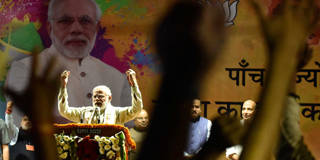The recent election in Uttar Pradesh, India's largest state, gave Prime Minister Narendra Modi and his Bharatiya Janata Party a strong mandate, providing the government with a golden opportunity to advance economic development there, while reaching out to the Muslim population. But Modi seems intent on fueling Hindu chauvinism.
PHILADELPHIA – A couple of weeks ago, Narendra Modi was celebrating his biggest electoral triumph since becoming India’s prime minister in 2014. His Bharatiya Janata Party (BJP) had swept into power in Uttar Pradesh, India’s largest state and one of its poorest. The scale of the victory left the BJP’s opponents shell-shocked, and seemed to indicate that Modi will be a shoo-in to secure a second term in 2019. Anticipating deeper economic reforms from a strengthened Modi administration, India’s stock market surged.
But there is one group with little reason to celebrate the BJP’s victory: India’s 172 million Muslims.
For decades, most of India’s political parties have practiced forms of “strategic secularism” to secure a so-called Muslim vote bank – an approach that has stoked resentment among the country’s Hindu majority while doing little to improve Muslims’ wellbeing. The BJP has gone another route, focusing on drawing votes from aggrieved Hindus. In Uttar Pradesh, the BJP did not put up a single Muslim candidate, even though about 18% of the state’s population is Muslim.

PHILADELPHIA – A couple of weeks ago, Narendra Modi was celebrating his biggest electoral triumph since becoming India’s prime minister in 2014. His Bharatiya Janata Party (BJP) had swept into power in Uttar Pradesh, India’s largest state and one of its poorest. The scale of the victory left the BJP’s opponents shell-shocked, and seemed to indicate that Modi will be a shoo-in to secure a second term in 2019. Anticipating deeper economic reforms from a strengthened Modi administration, India’s stock market surged.
But there is one group with little reason to celebrate the BJP’s victory: India’s 172 million Muslims.
For decades, most of India’s political parties have practiced forms of “strategic secularism” to secure a so-called Muslim vote bank – an approach that has stoked resentment among the country’s Hindu majority while doing little to improve Muslims’ wellbeing. The BJP has gone another route, focusing on drawing votes from aggrieved Hindus. In Uttar Pradesh, the BJP did not put up a single Muslim candidate, even though about 18% of the state’s population is Muslim.